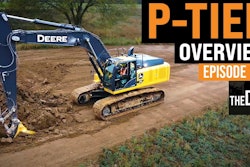In this episode of The Dirt, we take a look at the role engine oil plays in reducing emissions and making sure you’re using the right oil for your equipment’s aftertreatment system.
Shawn Whitacre, Chevron’s senior staff engineer for engine oil technology, discusses lubricants’ effect on emissions and what equipment owners need to be mindful of when choosing their oil.
The topic is timely, now that the Environmental Protection Agency has released its final rule on heavy-duty truck emission standards. The rule calls for a reduction in pollutants by model year 2027.
So far the rule only affects on-highway trucks, but Whitacre notes that in the past, off-road equipment regulation has typically followed the on-road standard.
To learn more about your equipment’s emissions and the proper engine oil, check out the latest episode of The Dirt.
Equipment World serves up weekly videos on the latest in construction equipment, work trucks and pickup trucks – everything contractors need to get their work done. Subscribe and visit us at equipmentworld.com!
In This Episode:
00:00 - Intro: How Can Fluids Help Contractors Meet New EPA Regulations?
00:44 - What Can Contractors Do to Reduce Diesel Particulate?
03:37 - How Does Engine Oil Impact Emissions?
06:47 - How Are Engine Oils Developed to Meet New EPA Regulations?
09:31 - How to Know When to Change Engine Oils
11:12 - Final Thoughts
Bryan Furnace (00:00):
Hi, everybody. Welcome back to Equipment World. You're watching The Dirt. I'm your host Bryan, and today we're here to talk about fluids again, but we're coming at it from a little bit different of an angle because the EPA has rolled out some additional regulations to clamp down, and there's still that ever-present conversation about Tier 5 rolling out at some point here. There's just a lot happening when it comes to emissions.
(00:29):
So what can we do from a fluid standpoint to kind of assist us as contractors as we try to stay under and meet these new emissions regulations? Well, here to talk with us today is our resident Chevron representative, Mr. Shawn Whitacre. So without further ado, here's Shawn.
(00:44):
So my first question is, with some of the new EPA regulations that have rolled out, they're really focusing on diesel particulate. From a fluid standpoint, are there things that contractors can do to kind of get the diesel particulate down?
Shawn Whitacre (00:56):
So just to kind of clarify, there are a variety of pollutant emissions that are affected by EPA regulations on diesel engines, and they do, in fact, clearly focus on particulate matter, but there's also nitrogen oxides, hydrocarbons, carbon monoxide. The good news for end-users and contractors is that a majority of the requirements are compulsory on the equipment builder themselves. They're the ones that are the actual regulated entity and are responsible for making sure that the equipment is compliant with the standards at the time it's built, and also that it's robust to the kind of an operating environment that it's undoubtedly going to encounter.
(01:36):
One of the things that it does mean though, that they have to incorporate the proper sort of onboard diagnostics that monitor systems to make sure that they haven't failed or degraded or that the end-user hasn't somehow tampered with the system to drive it out of compliance, and that's clearly an area where the contractor does have some obligations. Some of these things are just sort of normal course of operation, and good thing about here in the United States market, it's very readily available to get ultra-low sulfur diesel. In fact, we only really have one diesel standard. That wasn't the case 15 years ago. Those days are behind us. So making sure that you're getting good quality diesel fuel, that it's clean.
(02:19):
Diesel exhaust fluid plays a role in emissions compliance as well, so making sure that the DEF tank, if there is one, on the piece of equipment that it's full, that you're utilizing certified quality DEF. That means that it has the right combination of the actual urea and water that the system requires.
(02:37):
And then, of course, lubricants play a role as well. Having a low ash lubricant that meets the requirements of today's hardware is certainly pivotal in keeping that emission control system clean and the system functioning as intended. And that all sort of plays into the long-term emissions compliance of hardware.
Bryan Furnace (02:57):
So really, the net net of that is contractors don't have to worry so much about being compliant with the EPA, just as long as you're not materially impacting the emission system that was put in place by the manufacturer. The onus is really on the manufacturer to meet EPA regulations.
Shawn Whitacre (03:13):
Yeah, I mean, they're undoubtedly could be local specific requirements that the contractor may be obliged to meet on a very local level, but those aren't the focus of the emission standards that EPA promulgates that, as you say, are largely kind of the burden of the manufacturer to be compliant with.
Bryan Furnace (03:37):
So now I am going to ask you a question since you're my resident scientist here. From what I understand, the oil itself doesn't necessarily cause soot, but it does cause ash that can have negative impacts on your emission system. What I've always been curious about is, can oil have an impact on NOx emissions, or are you really more worried about the ash side of things?
Can oil have an impact on NOx emissions, or are you really more worried about the ash side of things?
Shawn Whitacre (05:19):
So probably not a direct impact that the lubricating oil has on NOx emissions, but they're very much implications in terms of overall engine design that does affect the engine oil. So if you think historically, there've been different means by which engine manufacturers have pursued NOx control. The very early ones utilized retarded injection timing to affect engine-out NOx levels. That had an impact of increasing lube oil sooting rates, and so there are formulations that have been developed that are more robust to the higher levels of lube oil soot that is encountered in engines that have retarded injection timing. Same is true for engines that utilize exhaust gas recirculation.
(06:08):
Where lubricants do play a role in hardware that utilizes mission control systems like DPFs and SCR, is that there are limits to things like phosphorus, sulfated ash, and sulfur that we can put in a lubricant, and as that engine oil is consumed, ends up in the exhaust and then ultimately ends up kind of laying on those emission control systems over time. They can degrade in their performance and that's why there have been limits put on how much of those kind of species that we can utilize in oil formulations to make sure that those systems remain in compliance for the duration of which they're regulated.
Bryan Furnace (06:46):
So my next question is the EPA is continuing to roll out additional regulations, but are you guys actively working on formulations to kind of stay ahead of the EPA on these things, or do they give you a set of future regulations and give you time to come down to them? How are you handling that on your end on the developing side?
Shawn Whitacre (07:05):
Yeah, so since we've last talked, we last talked back in November of 2022, EPA finalized their rule-making in mid-December for the next generation of heavy-duty truck standards, which will go into effect in early 2027. Although it's not set in stone, we usually anticipate that similar standards will be developed to affect the non-road market. In fact, we've already got evidence that that's kind of on the way here in California. And a lot of the same things that we're doing in anticipation of those 2027 standards will sort of preemptively help off-highway equipment if and when those regulations begin impacting them.
(07:45):
So it's the same types of things that we've been doing historically. It's constraining catalyst poisons, things that can accumulate in the system and degrade them over time. We're looking at maybe further constraints on sulfated ash, lower levels of phosphorus and lower levels of sulfur, all of which can help contribute to the longer useful life and higher performance of those systems to meet these very demanding standards. NOx standards are coming down by something like 75%. There's about a 50% reduction in already very low levels of particulate matter, and so engine builders, equipment builders have their hands full, but we've got a long history of meeting these very demanding standards, and I'm very confident that we'll rally once again and deliver on the requirements that demanded for Clean Air.
Bryan Furnace (08:35):
Boy, if I wasn't mistaken, Shawn, I'd almost pick up a little cockiness in that statement.
Shawn Whitacre (08:41):
Well, I've been doing this long enough to know that a lot of times these things seem insurmountable at the start, but it is an all-hands-on-deck thing. It's engine builders, it's subsystems suppliers like fuel injection equipment. Of course, for the past 16 years or so, the emission control system suppliers have been pivotal in advancing the state of the art and allowing these systems to become more and more efficient. What we're counting on them now to do is reduce engine-out emissions by something like 98% from the levels that are coming out of the engine itself so that you can get down to those very low levels demanded by the standards. And then our role is to keep them that way, and so make sure that fuels and lubricants don't prematurely degrade their performance and allow them to meet those standards well into the future.
Bryan Furnace (09:30):
So my final question for you is, as a contractor, how often do I need to check the label on my bottle to see what's new and what's out there versus just going after the same jug I've been using for the past five or seven years?
Shawn Whitacre (09:44):
Yeah, good question. I mean, I think we always encourage periodic conversations with your lubricant supplier to make sure that you're taking advantage of the state-of-the-art that might be benefits that can help improve your fuel economy, and especially if somebody's kind of transitioning to their first-generation of emission control system equipped hardware. Maybe they've had a piece of equipment that's 15 years old and they're replacing it for the first time. Sort of a new dynamics at play when you've got DPF and SCR.
(10:11):
Or if you're switching to equipment from a new builder, right? So you're moving from Cat to Volvo or moving across suppliers, that can have impact on the lubricant requirements and maybe a good point in time to kind of revisit your lubricant selection, making sure that you're using a product that meets the requirements of that hardware, but then also helps in terms of all your business goals. Whether that be maintenance-related or operational and fuel savings and so forth.
(10:39):
There's a lot that continues to be developed. We, obviously, are at the forefront of ultra-low ash technology and we think that's a very pivotal technology for the off-road market that helps enable emission compliance, as well as fuel economy retention and kind of lower maintenance overall that keeps equipment in revenue service. A lot of times end-users aren't familiar with how the lubricant can impact all of those things, and it starts with asking the question.
Bryan Furnace (11:06):
Well, Shawn, as always, this has been very informational and I appreciate the time.
Shawn Whitacre (11:10):
Yeah. Thank you for the time.
Bryan Furnace (11:12):
Well, thank you again to Shawn, as always. It's a pleasure having him on the show, and hopefully, this has given you a little idea as to how fluids can impact your machines and what we need to be aware of as contractors. This isn't something that needs to be at the forefront of everyone's mind in our industry, but at the same time, knowledge is power when it comes to this sort of stuff, and that's what we're here to give you is more knowledge so that you can translate that into power on your end. So as always, thanks for watching. We'll catch you guys on the next episode of The Dirt.









